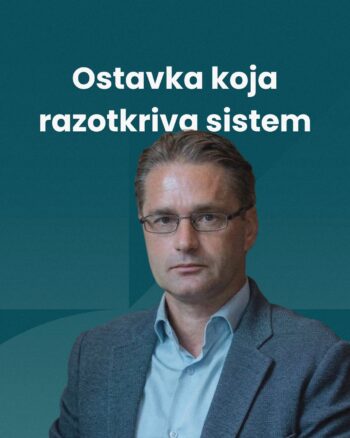Non-governmental organizations – Media Center, Montenegrin Media Institute, Centre for Civic Education (CCE), and Center for Investigative Journalism (CIN-CG) – assess that the resignation of Neđeljko Rudović, Director General of the Media Directorate at the Ministry of Culture and Media, is yet another confirmation that state administration does not support professionals who have expertise and integrity but are not willing to sacrifice their principles for the sake of holding office.
In his public explanation of the resignation, Rudović confirmed what we have been warning about for months – that the authorities are obstructing the implementation of media laws to prevent undesirable NGO candidates from legally becoming members of the Council of the public broadcaster RTCG and the Agency for Audiovisual Media Services (Agency for AVMS).

We recall that the process of drafting the media laws began under Minister Tamara Srzentić in the 42nd Government, continued during the 43rd Government with Minister Maša Vlaović, and concluded in June 2024 under the current Minister Tamara Vujović in the 44th Government. The entire multi-year process, which followed the adoption of the first Media Strategy, was led by Neđeljko Rudović. Dozens of representatives from institutions, commercial and public media, and NGOs participated in the working groups focused on shaping key policies for improving the media environment. Reaching optimal solutions that could receive broad support was no easy task.
The media laws were adopted as part of the so-called IBAR package, with support from civil society and the opposition. The only controversial amendment, introduced at the initiative of the Prime Minister’s office, related to lowering the criteria for the position of RTCG’s Director General to enable the legalization of Boris Raonić’s appointment, even though this attempt ultimately failed, as confirmed by the most recent court ruling. Rudović opposed this amendment and was consequently openly attacked by the Prime Minister’s office and the parliamentary group of the Europe Now Movement (PES).
The problems intensified during the implementation phase, particularly regarding the appointment of the governing bodies of RTCG and Agency for AVMS. Although the laws stipulate deadlines, calls for council members were delayed for up to six months, and even when issued, they were repeatedly annulled for formal or fabricated reasons. These obstructions and delays have also been noted in documents of the European Commission and the European Parliament.
Furthermore, the parliamentary majority planned to amend the laws to install politically favourable candidates in the councils of RTCG and AVMS, a plan that was abandoned only after intervention by the EU Delegation in Montenegro.
On 10 July, the Administrative Committee adopted the list of complete and timely nominations for the councils of RTCG and Agency for AVMS, but additional elements not envisaged by the law, such as consultative hearings of candidates, were introduced. At that time, open hostility was also visible from the ruling majority towards NGOs that had legally and legitimately proposed candidates who fully met the criteria for appointment. The absence of the Minister and representatives of the Media Directorate from these sessions further weakened the application of the law and served partisan interests.
Rudović decided not to accept the further erosion of everything he had worked on for years. His resignation is an act of responsibility, not escape – an example of how public office should be understood: to be left when it becomes clear that there is no political support to enact systemic change.
We regret that Minister Vujović did not respond to months-long obstructions to the implementation of the media laws. We would like to believe that she can still show courage and authority in relation to her party colleagues to ensure that both the spirit and the letter of the law, for which she is directly responsible, are respected.
One day after the public hearing of the candidates, Rudović submitted his resignation, and the Administrative Committee, under pressure from the EU, confirmed the lists, including those with NGO representatives. We hope the parliamentary majority will fully respect this stance of the EU by confirming three new RTCG Council members and two members of the Agency for AVMS Council during the plenary session, thereby finally starting the effective implementation of laws adopted over a year ago.
We take this opportunity to publicly thank Neđeljko Rudović for his cooperation and consistency. NGOs not only criticize, but they also know how to recognize and commend when someone in public office demonstrates knowledge and prioritizes principles over personal gain.
We urge the authorities to stop driving professionals out of public administration and to stand closer to those with expertise and integrity, rather than to those who knowingly violate the law and bargain at the expense of the public interest. Otherwise, the only constant in the stalled reform process will remain political favouritism, which continues to undermine institutions.
Goran Đurović, Media Center
Olivera Nikolić, Montenegrin Media Institute (MMI)
Daliborka Uljarević, Centre for Civic Education (CCE)
Milka Tadić Mijović, Center for Investigative Journalism (CIN-CG)
